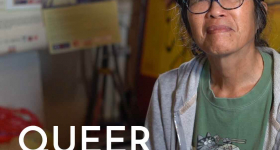Faridah Diamrang sits in the basement of her home in Maladeg, Philippines while her mother untangles rice sacks used to make pillows.
Marvi Lacar has always been fascinated with the idea of relative realities, an idea informed by her experiences growing up in a conservative, third world country, then adapting to its socio-political antithesis while living in the United States. Sex, for example, can be as hedonistic as it can be selfless. As a child in the Philippines, Lacar saw sex as a means of escape for those trapped in a life of poverty. But subsequent travels to wealthier nations opened her eyes to a more exploratory treatment of sex and sexuality. This treatment is evident in one of Lacar’s projects about girls, where she captures a balancing act between innocence and sexual discovery during an age where many girls are at their most self-absorbed, but least self-aware.
Another one of Lacar’s projects focuses on the Muslim-Christian conflict in the southern Philippines and the stories of villagers who have lived through ongoing clan wars.
Lacar’s work has appeared in Time, Newsweek, the New York Times and Los Angeles Times.
She lives in New York.









Comments